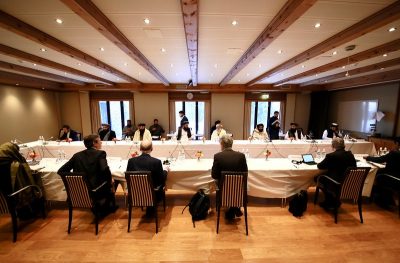Last week’s series of controversial meetings with the Taliban in Oslo reflect Norway’s aim to revive its role as an international peace broker, and help fend off another mass migration crisis. Debate continues, meanwhile, over the three days of talks with the terror organization now holding power in Afghanistan.

More than 20 individual meetings were held between Taliban leaders and women’s rights activists, humanitarian organizations, representatives of several western nations including the US, and foreign policy and finance experts. Concrete results of the talks remain unclear, however, after the Taliban delegation flew back to Kabul in the much-contested private jet Norway had chartered for them.
“The (Norwegian) foreign ministry is realistic, but satisfied,” Henrik Thune, one of the ministry’s state secretaries, told newspaper Aftenposten when the meetings were over. “It’s the sum of the meetings that’s most important.” It wasn’t the first time Norway, long a part of international efforts to defeat the Taliban, had invited the Taliban to Norway and may not be the last.

Thune told newspaper Klassekampen that the meetings were a step towards more such attempts at conflict resolution abroad. Norway has long been involved in peace broking from Colombia and Venezuela to the Middle East and Sri Lanka. He concedes that Norway’s efforts haven’t always been successful, but they’ve provided experience on how Norway can use its role as a country without all the vested interests of much larger ones. He suggested that Norway may be able to prod conflict resolution in Yemen and Ethiopia, and already is active in Sudan.
“Our most important areas of concentration are in the whole belt from West Africa via the Middle East to Afghanistan,” Thune said. “This is what we view as Europe’s unstable neighbourhood, and conflicts there are especially important because they can have huge political and international implications.” Norway and the rest of Europe especially fear a new refugee influx from Afghanistan, as residents try to flee the Taliban, and want to fend it off.
Last week’s meetings in Oslo marked the first time there’s been any dialogue between the Taliban and representatives of Afghanistan’s civil society, for example. Several Afghans also flown to Oslo didn’t realize they’d finally have a chance to meet those who’ve seized power in a country now on the brink of famine and economic collapse.
“I thought I’d be meeting with representatives from Norwegian authorities,” Hoda Khamosh, a poet and activist in Afghanistan, told Aftenposten. She said she was very surprised when she was told she’d be meeting the Taliban in Oslo, but “chose to take part to be a voice for Afghan women.”
Khamosh stressed that “here in Oslo, they (the Taliban) are polite and treat us with respect, but they don’t do that in Kabul. I fear what can happen to me when I return.” At the same time, she and Mahbooba Siraj, another Afghan activist chosen by Time magazine as one of the world’s 100 most influential people in 2021, think it’s better to have direct dialogue and welcomed the opportunity in Oslo. Siraj thinks the Taliban will now have to follow up, for example, on a stated promise in Oslo to allow girls aged 12 and up to return to school this spring.
Broke the ice
The meetings in Oslo can also make it easier for the international community to now have more ongoing contact with the Taliban. The proverbial ice was broken, and that’s also important for efforts to improve the humanitarian situation in the country.
The Taliban was also made acutely aware of what they’ll have to do in order to get the rest of the world to be willing to move forward with any cooperation. Letting girls go back to school is one of those things. The meetings also provided a forum for exploring technical solutions needed to channel more humanitarian aid into the country via non-governmental organizations, the World Bank and the UN system. The Taliban representatives in Oslo were also given the names of human rights activists who’ve been abducted or arrested and must be freed from detention.
‘A beginning’
Thune of the Norwegian foreign ministry stressed that he doesn’t expect any quick solutions to the crisis in Afghanistan, “but it’s a beginning.” He also continued to claim, as have Foreign Minister Anniken Huitfeldt and Prime Minister Jonas Gahr Støre, that the meetings did not amount to any formal recognition of the Taliban as legitimate leaders of the country. Others disagree, not least after the leader of the Taliban delegation called the meetings “a great victory” for the Taliban. Thune insists it was not.
“They realize that themselves, but used the opportunity to have a stage,” said Thune, who represents the Labour Party. The meetings were also a platform, he claims, for criticism of the Taliban. Any normalization of relations is far off in the future “and they know that,” Thune added. “The ball is in their court regarding progress.”
‘Feather in the cap’ for Støre
Norway’s new Labour Party-led government, meanwhile, also sees the Taliban meetings as the beginning of a new round of international diplomacy and peace-broking efforts. Kristian Berg Harpviken of the Oslo-based peace research institute PRIO thinks the meetings were important and “a feather in the cap” for Prime Minister Støre, who was leading the UN Security Council in New York last week and could report directly on what was happening in Oslo. “It grabbed the attention of Norway’s allies,” Harpviken told Aftenposten.

Norway took the initiative for the talks, which were planned in cooperation with allies including the US, the EU, Great Britain, Italy, France and Germany in addition to the UN. They never would have been held without approval from the US, which later thanked Norway for organizing and financing the meetings. All involved ended up issuing a “joint statement on Afghanistan” that detailed what’s expected of the Taliban (external link to the ministry’s website).
At the UN in New York, Støre referred to the Taliban delegation as “the de facto Afghan authorities” and claimed “it was not a bilateral visit in the traditional sense.” Rather, he said, the meetings provided an opportunity for Afghan civilians to engage the Taliban in dialogue and an opportunity for Norway “and a range of national delegations to engage the Taliban representatives on how the needs of millions of Afghans … will be met in the time to come.”
Støre: ‘Taliban got the message’
“Let me be clear,” claimed Støre in his address to the UN Security Council, “the Taliban heard the serious concerns shared by a variety of representative civil Afghans as well as a united international community. The visit did not bestow international recognition on the de facto regime. It provided an opportunity to talk, exchange and formulate clear expectations on the way ahead.”
Støre, who could also address the council in his fluent French as well as English, said it was “essential” that the UN Security Council provided the UN political mission with a “comprehensive and robust mandate to engage” with the Taliban, to monitor and report on the human rights situation and to facilitate the delivery of humanitarian assistance and support to basic human needs.
“We must not forget, however, that the primary responsibility for responding to the current acute crisis lies with the de facto authorities,” Støre stated. “The Taliban must listen to the appeals of the Afghan people and the international community to respect human rights and to establish a more inclusive and just government.”
Støre traveled on from New York to Washington DC, where he suddenly was invited for a fireside chat of sorts with US President Joe Biden. After a very rough start for his government, that crowned a week of intense diplomacy for Støre, a former foreign minister who’s highly respected abroad if not always at home.
newsinenglish.no/Nina Berglund

